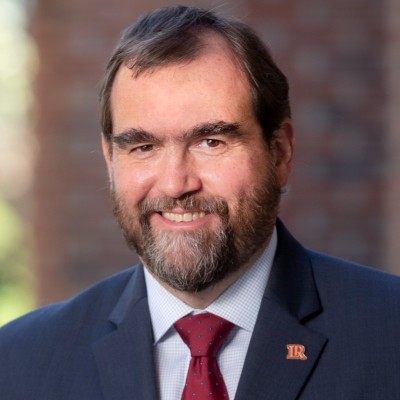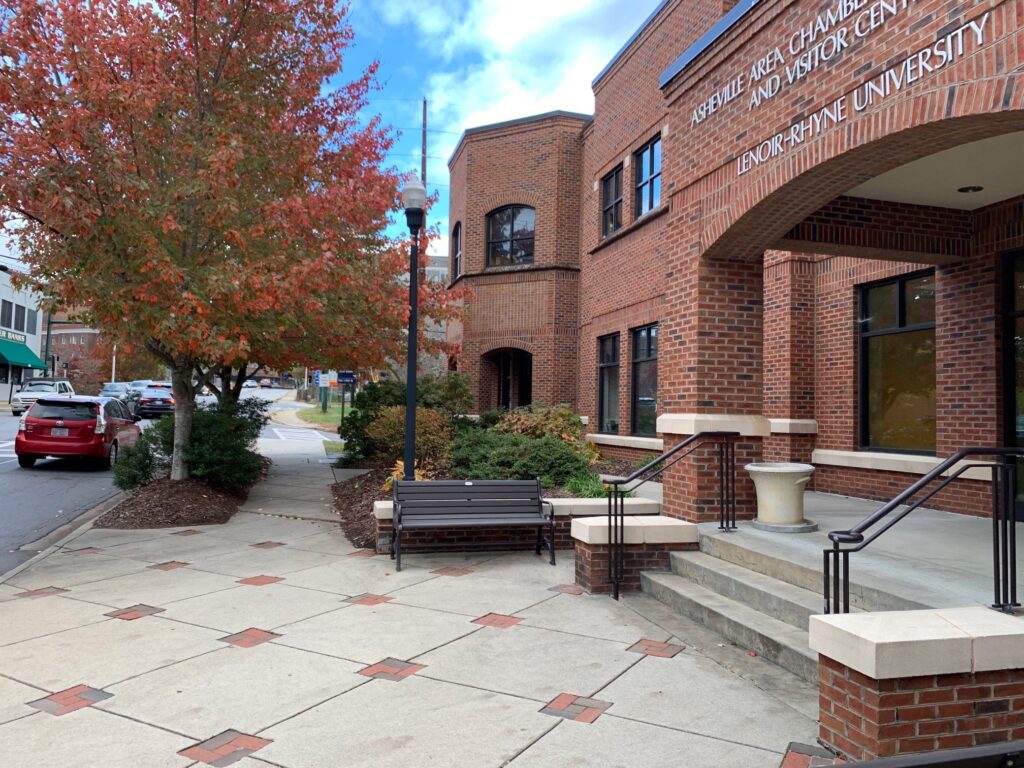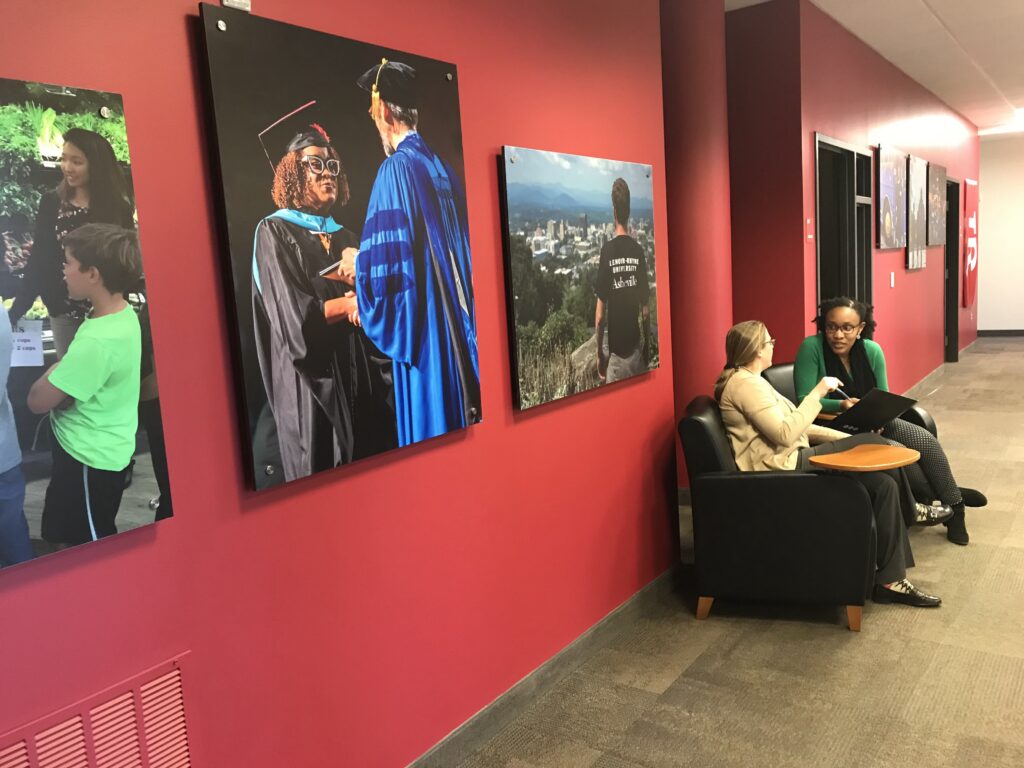 In the heart of Asheville, N.C., one of the nation’s most beautiful and spirited small cities and an hour or so from its main campus, is a building that houses Lenoir-Rhyne University’s Graduate Studies program. It serves primarily adult learners in their 30s and 40s, though it has graduated those at both ends of the age spectrum, including a lifelong engineer who felt the need at 83 to pursue a master’s degree in fine arts. Oh, the possibilities.
In the heart of Asheville, N.C., one of the nation’s most beautiful and spirited small cities and an hour or so from its main campus, is a building that houses Lenoir-Rhyne University’s Graduate Studies program. It serves primarily adult learners in their 30s and 40s, though it has graduated those at both ends of the age spectrum, including a lifelong engineer who felt the need at 83 to pursue a master’s degree in fine arts. Oh, the possibilities.
As enrollments of undergraduates have dipped over the past few years, there has been a keen interest taken by institutions of higher education on one that has grown a bit. Graduate programs not only present the potential for more students and the continuance of lifelong learning but also opportunities to connect beyond campus. The small, private Lenoir-Rhyne program has an astounding 120 partnerships, including 85 in Asheville alone. Not coincidentally, it has grown that pool of enrollees by around 17% since 2019.
So what are their secrets to success?
“It’s a very vibrant community,” says Michael Dempsey, Dean & Director of Lenoir-Rhyne Graduate Studies. “We have a very high-quality facility. All the rooms are tricked out with the latest technology. [Students] get a very individualized learning experience. Our classes are typically small. We hire professors who live in this community. We own two thirds of the building. The entity that owns the other third is the Asheville Area Chamber of Commerce, which is a master stroke, if you will, on how you connect with the business community and serve students at the same time.”
But Dempsey says it is so much more. It is extremely competitive in pricing. It has embraced “hybrid learning and turned it on its ears.” It has under its roof an Equity & Diversity Institute that boasts a 30-seat-hour platform for students to explore the topics in professional settings. And it is incredibly open-minded when it comes to collaboration, something that can be a lesson for other institutions and programs struggling to make headway.
To learn more about how this small university grad program is excelling and what Dempsey sees in the future for the industry, University Business sat down with this former longtime journalist to get his take:
Lenoir-Rhyne’s program came out of the pandemic pretty well. How did it manage to do that given the challenges facing much of higher ed?

From fall of 2022 to fall 2023, we grew by 10%. That was a bit of a surprise. We didn’t know what was going to happen, certainly at universities, where we pride ourselves on direct contact with people. We were doing some stuff differently when the pandemic started from a PR and marketing standpoint. The partnerships have helped us grow our enrollment tremendously. But I think a lot of people got very philosophical and thought, now is the time for me to make a move in a different direction with my career and decided to go back to school. Most of our programs are very job-oriented. We have a high level of educational attainment in the Asheville area of people who already have bachelor’s degrees in our area compared to the rest of the state.
Some of the university’s decisions have been to do away with tradition and deliver online for students. Talk about those efforts.
As the Academy has changed over the years, we are much more astute at delivering coursework to someone in the comfort of their home, so that they can do what they do for a living. Consumers have gotten really used to doing things their way. And we have to transform to serve people’s needs. Some universities have said, forget about it, everyone’s coming back to the classroom. Well, that’s just not how Lenoir-Rhyne University operates. Yes, there’s a certain undergrad experience where you’re going to want to have your 18-year-old in a classroom, but when you’re talking about adults who are very good at managing themselves, you want to assist them in any way you can.

Can you provide insight into the winning formula you have for building partnerships and relationships?
As a non-state institution, we have much more leverage than typical state schools to do what we want to manage our revenue. So, our tuition discount partnerships go two ways. We approach a company and say, we would like to engage with your employees and tell them what we have to offer. We’ll give them a small discount to come to us. We also say to them, if you want one of our professors who is a content expert to help your company, we would be happy to have them speak to your folks for a half day or a luncheon, talking about their area of expertise.
More from UB: President Series: Creating partnerships and lifelong learning
How do you connect with the business community and serve students at the same time? If a college president approached me and said, we’re thinking about doing this, what are your recommendations? First I’d say, you have to have assets to pull it off. But if you can do it, put a stake in the ground and say, we’re investing in this community. We’re going to do this a little differently than the average university has done, and really show the community that you want to be a part of it. It’s been a real boon for us. There’s no silver bullet for growing enrollment. But through partnerships and by being able to connect significantly with companies, people see us time and again helping them. Word of mouth gets around that our programs are beneficial. Next thing you know, we have a lot of people coming from a certain company to take classes.
Do you foresee an expansion of partnerships for higher ed in the future?
We’re going to see a lot more collaboration across institutions in the future, rather than competition. We’re doing it here in Asheville. All of the universities and colleges, community colleges and K-12 systems are now sitting at the table talking about how we can nurture people through their educational journey, and get them into family-sustaining jobs. Higher ed is very competitive, but let’s move past that. We can do this collectively with other institutions, to help draw employers and people to our region, and to serve them better. Lenoir-Rhyne is a very different place than Warren Wilson College. We’re very different from the community college down the road. And we’re very different from the big university in Western Carolina. But put all these apples in one basket, you’ve got a pretty good bag of apples that can go pretty far. That’s much smarter than being overly concerned about getting our piece of the pie.
A truly forward-thinking piece is the Equity & Diversity Institute, which was in the works before the George Floyd murder happened in 2020. Are those the kinds of initiatives that can truly make a difference in higher ed and in communities?
About 20 years ago, we diversified our business model greatly to include lots of professional-based graduate studies programs. Then we added two campuses. So, taking a student that formerly went from point A to point B, which would be high school graduation to college graduation, and now taking them from point A to point C, which is the graduate college. As you look at the demographics in the United States, by the year 2040 we are going to be a minority-white country. Furthermore, the younger people coming up, they’re very interested in impact. And they’re very interested in leveling the playing field for different types of folks.

I was raised in Charleston, S.C., in a very segregated place. We didn’t talk about equity much in the late 70s. Now, younger people and older people are very concerned about this. And that’s good for business. If you want your business to survive, you don’t want to just hire the same people over and over again. Innovation comes from different viewpoints and thinking differently. So, how do you recruit equitably? Have you taken an inventory and equity inventory of your business? How do use analytics equitably? When we engage with adult learners, folks who have come from underrepresented populations, we’ve got to be doing stuff that’s really innovative and really special. Not bells and whistles and stuff to just make it appear to be valuable. But add real value to their lives.
So becoming much more open, then?
Universities are much more focused on a wider group of people than they had been in the past. It’s a different business. If you read our mission statement, it doesn’t have anything to do with revenue. It has to do with helping people make their way in the world and helping people become better versions of themselves. That’s the rock we stand on.







